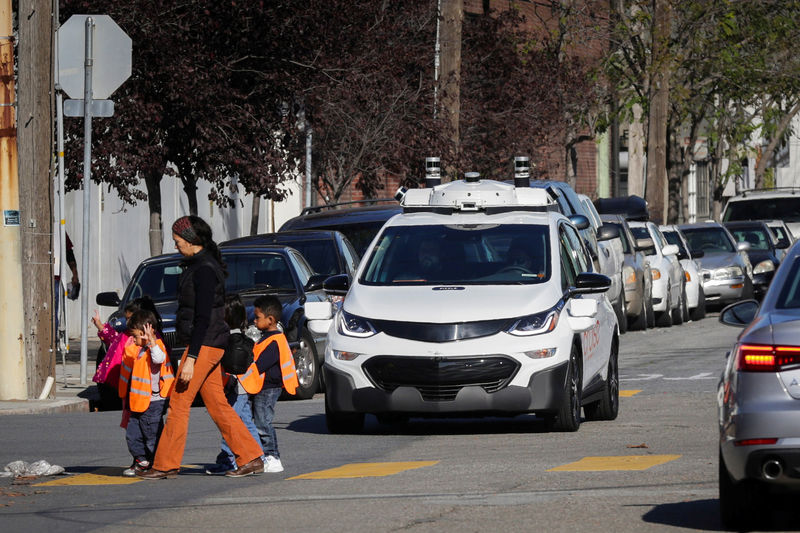By Alexandria Sage and Paul Lienert
SAN FRANCISCO/DETROIT (Reuters) - General Motors Co (NYSE:GM) laid out its vision for self-driving vehicles on Thursday, telling investors it planned a commercial launch of fleets of fully autonomous robo-taxis in multiple dense urban environments in 2019, in a challenge to rivals such as Alphabet (NASDAQ:GOOGL) Inc's Waymo.
Underscoring the potential opportunity ahead, GM President Dan Ammann told investors the lifetime revenue generation of one of its self-driving cars could eventually be in the "several hundred thousands of dollars." That compares with the $30,000 on average that GM collects today for one of its vehicles, mostly derived from the initial sale.
The No. 1 U.S. automaker - which views electric and autonomous vehicles as the keystones of future transport - has been focused on rolling out self-driving cars since its estimated $1 billion acquisition of startup Cruise Automation in early 2016 that provided a toehold in the nascent industry.
Automakers and rivals such as Waymo and Uber Technologies Inc have poured billions into the competitive industry, with each player hoping to gain first-mover advantage. Robo-taxi services are seen as the main use for most self-driving vehicles, including GM's Chevrolet Bolt.
"If we continue on our current rate of change we will be ready to deploy this technology, in large scale, in the most complex environments, in 2019," Ammann said on a conference call.
Safety, Ammann said, will ultimately be the deciding factor on when to take the driver out of the car.
GM has enjoyed a recent surge in its share price, as investors bet on its plans for self-driving and electric cars, although the company's profit is driven entirely by demand for trucks and SUVs in North America, and its growing sales in China.
GM shares were down 1.7 percent at $43.05 on Thursday afternoon.
Until now, GM has said autonomous vehicles were a big part of its future but did not give many details. Now, it has outlined more broadly its strategy, in which self-driving Bolts could be manufactured at scale at GM's existing plants, driving down costs, and rapidly deployed in major metropolitan markets through a ride service to disrupt incumbents.
"We are the only company that has this under one roof," Chief Executive Mary Barra said on the same call, distinguishing GM from its technology rivals in the autonomous sector.
GM said last month it sees deployment of autonomous vehicles in "quarters, not years," and this week it finally provided a peek at its prototype self-driving vehicles.
Self-driving cars and shared mobility will be accretive to GM's core business, Barra said, with the biggest opportunities initially to come from the U.S. East and West coasts.
Chief Financial Officer Chuck Stevens said a robo-taxi service could be "potentially bigger than our current core business, with better margins."
"We have a path to take 40 percent of the cost out of ride services," Stevens said on the same call. Lowering the cost to below $1 per mile by 2025 from about $2.50 today could result in margins of 20 to 30 percent, he said.
Using a vehicle for a robo-taxi service - rather than GM's current business model of building cars for individual customers - could increase revenue generation exponentially because the vehicle could be continuously used by multiple users over its lifespan.
Underscoring the competitive landscape, Uber said last week it planned to buy up to 24,000 self-driving cars from Volvo, owned by China's Geely Automobile Holdings Ltd, in a nonexclusive deal from 2019 to 2021. No financial details were disclosed.
As one example of bringing down the cost of autonomous vehicles, GM said it expects to lower the cost of long-range Lidar sensors - a key element in self-driving technology - to $300 from $20,000, without providing a time frame. In October, GM bought Lidar company Strobe Inc, saying its technology could lower the cost of the sensor by 99 percent.
GM said it was too early to discuss possible branding of its self-driving cars, or whether the Cruise or Bolt name would be used. GM also operates an app-based car-sharing business called Maven, which some have speculated could be the new brand name.
On Tuesday, GM's Cruise Automation gave reporters their first look at the autonomous Bolts that have been testing in San Francisco, Phoenix and Detroit. The cars conservatively navigated busy urban streets but encountered hiccups when it came to double-parked cars and traffic cones.
Earlier this month, GM announced plans to sell 1 million electric vehicles a year by 2026. The cars would be built on a platform that could accommodate multiple sizes and segments, lowering the cost of building them.
Waymo is often seen as the frontrunner in the emerging autonomous sector, although its business model is different than GM's as it does not build cars itself. Earlier this month, Waymo announced a planned self-driving robo-taxi service in suburban Phoenix, to carry its first passengers in the next few months. It has not given a time frame for a wider roll-out.
